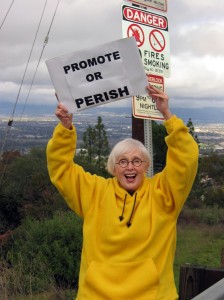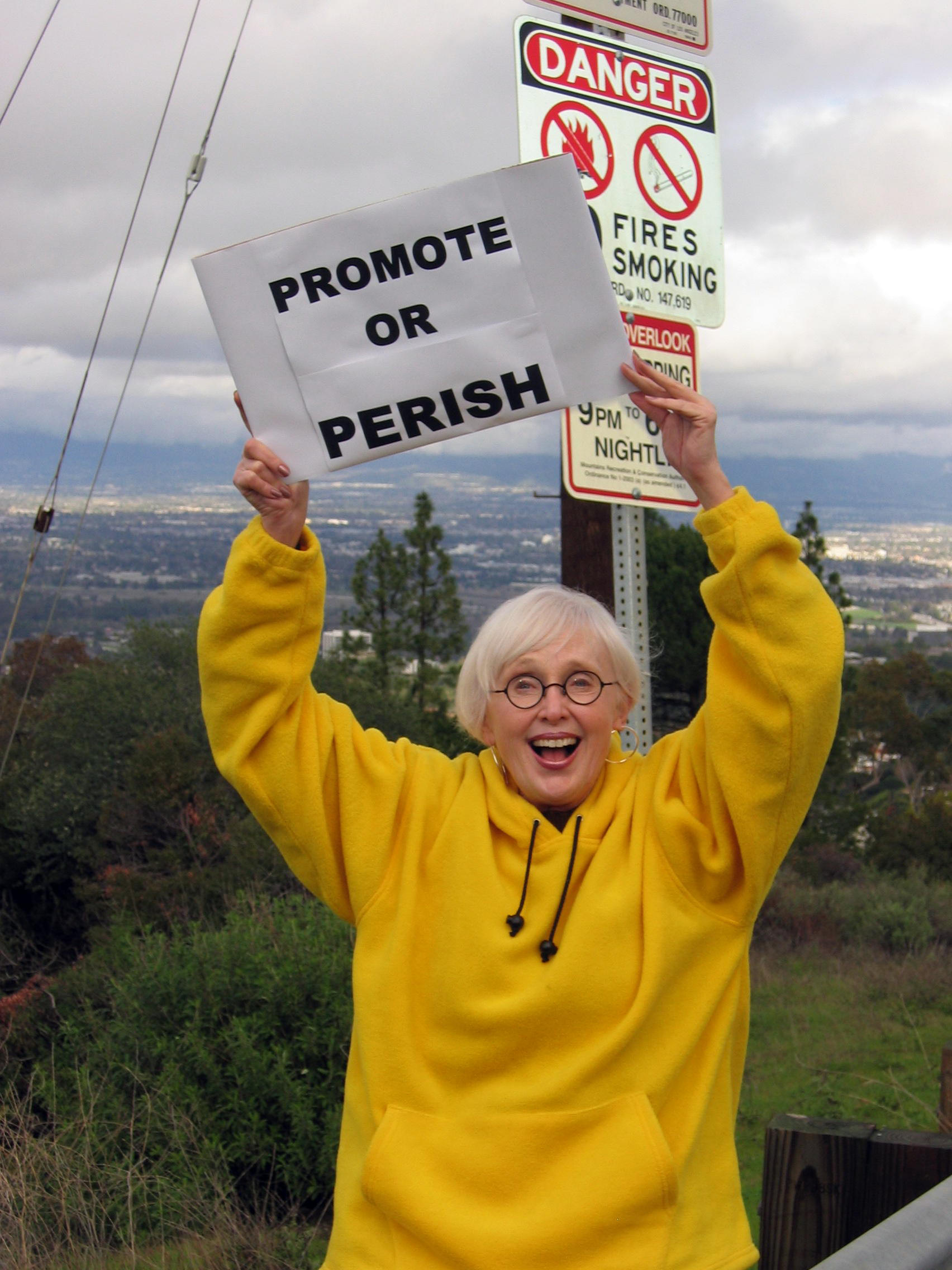
Carolyn Howard-Johnson is best known as The Frugal Book Promoter, but she has worn many hats including that of literary writer, poet, and writer for many well-known publications. We reached out to Carolyn to get her insights and wisdom on publishing, book marketing and editing.
Hi Carolyn, Thank you for taking the time to do this interview. For those who may not have seen your ‘The Frugal Book Promoter’ book, can you take a moment to tell us a little about yourself and your books?
I’m just a writer who love everything about writing. It’s a problem because that ranges from advocating for authors to copywriting to poetry and fiction. It makes it hard to focus, but it also keeps me positive and enthusiastic about writing.
You’ve seen the publishing space evolve over a long time. What’s different today?
I don’t think anything on the Web stays the same for more than a day. I had to learn the hard way. At first I wrote my how-tos for authors with as much detail about processes (like where to find things on Amazon) as possible. But page designs changed, links went bye-bye (even the ones famously called permalinks) and changes often meant that users needed to adjust everything from their philosophy to the way they work. That meant I had to adjust so I could bring authors more of what they need–both today and tomorrow. The basics like writing a great media release and putting together a great media kit never go away. And the way to think about promotion and marketing doesn’t change. So now I concentrate on things like how to make the most of a book fair or a book signing or suffer the consequences. Once we learn how to apply the basics, we can apply them no matter how the industry changes.
By the way, as a writer I formed a policy a long time ago. I don’t have to know all the tech all the time. I can learn what I need as the changes occur. You know. It’s learning on an as-needed basis.
Can you tell us a little more about ‘The Frugal Editor’ – why should authors read it?
Authors should read it because they for the first time they will be in charge of or partners in every aspect of publishing (one of those changes mentioned in the last question). Even if they snag a big New York publisher. Budgets are tighter. Authors want more control over their own careers if for no other reason than that–these days–they can! Knowing the difference between style choices and grammar rules will make better, more original authors of them! And this book does things that other books on editing don’t do, like help an author think like agents or other book professionals. Once we can do that, we’re in a better position to avoid major publishing booboos.
As an example, did you know that there are very few Jackie Onassis styles acquisition editors at publishing houses these days, that everyone is running on tighter budgets on everything from book cover artists to copy editors to marketing. Authors who don’t know about grammar and voice and formatting, and frontmatter and indexes, and . . .well, you get the idea! It’s a big publishing world out there, a world full of potholes just waiting for us to fall into.
Given that you recommend doing things frugally, should indie authors hire an editor for their books? How much does an average editing job cost? What are the benefits? How should an author select an editor?
These are all topics I cover in The Frugal Editor. In great detail. You don’t want me to write another book for you, do you? Ha!
Yes, everyone should hire an editor, but only a good editor. Authors who hire a typo hunter or their high school English teacher (who probably knows nothing about publishing) will waste their money. And we all know that most authors can ill afford to hire an editor for every document like query letters, press releases, media kits. And those are as vital to the success of a book as writing a great book. In The Frugal Editor I also caution writers: “You wouldn’t choose a contractor for a remodel of a house based solely on price, would you?”
What are some of the biggest mistakes newbie authors make with their books?
One of the biggest is signing a one-sided contract that protects the publisher and does nearly nothing for the author. One of the biggest editing mistakes is ignoring dialogue (nonfiction authors are especially guilty of this) or knowing nothing about writing dialogue or punctuating it. This is one aspect of writing that even those who grabbed down As in English have no training in whatsoever. Even those who think they do.
What are some of the simple, low-cost things that authors can do to promote their books
I love the kind of marketing that lets us do what authors usually like to do. That is, to write! So, in The Frugal Book Promoter, there is a chapter on marketing that covers ways to do that. My favorite is to write articles or edit excerpts from one’s own book to use as articles. . .or essays. . .or op-ed pieces. . .or first person columns.
How can an author get an outstanding book cover in a frugal manner?
How did you know! I am partnering with the cover designed I used for The Frugal Editor and The Frugal Book Promoter, Chaz DeSimone, to write a how-to book on this very topic. It’s amazing how much is involved in a great book cover, including marketing. Choosing a title. Thinking in advance about the future of the book and possible spinoffs. The use of keywords in the subtitle. Gleaning blurbs (endorsements) to go on the back cover–blurbs that are credible and help sell books.
Is it still possible to make a living as an author in today’s crowded marketplace? What can an average author expect from her publishing journey?
Absolutely! The keyword here is persistence. That means we have to continue to learn. As you have seen, we authors must be jacks-of-all-trades like we never had to before. You know those “overnight successes” we read about in the newspaper? They’re only overnight successes because we just heard of them. They’ve been honing their craft, teaching, developing new skills. Malcolm Gladwell says it takes about ten years for a person in any field to become an overnight success. Yes, I’m paraphrasing. But that’s the gist of it!
You’re also active on Pinterest. Is there any learning that you can share from here with authors?
One of the things I tell authors in The Frugal Book Promoter is to reread their book(s) with their marketing hats on. Fiction, poetry. Whatever. And watch the news cycles. We must keep wearing that marketing hat so that we can apply all the aspect of our books to what’s in the news, what’s on the Web, etc. Pinterest can be very efficient if we focus. Every author should have at least a few bulletin boards on the topic of writing or fields related to the theme or subject of their books and at least one bulletin board that makes it very clear that board is about that author’s books and writing career.
I have a marketing device, I use. I tell those who subscribe to my newsletter and blogs: “You pin my book cover (or covers), and I’ll pin yours.” But I can’t do it if I can’t find their covers on their Pinterest page or have to dig through 500 pins to find it! You’ll notice that little motto is in my e-mail signature, too:


Carolyn Howard-Johnson
Instructor for nearly a decade at the renowned UCLA Extension Writers’ Program Author of the multi award-winning series of HowToDoItFrugally Series of books for writers
Amazon Profile: http://bit.ly/CarolynsAmznProfile
The Frugal Book Promoter: http://bit.ly/FrugalBookPromo
Web site: http://www.HowToDoItFrugally.com
E-mail: CarolynHowardJ@AOL.com
Facebook: http://Facebook.com/carolynhowardjohnson
Twitter: http://Twitter.com/FrugalBookPromo
Pinterest: http://Pinterest.com/chowardjohnson
You pin one of my book covers, and I’ll pin one of yours!
Let’s Network Today!
Where can readers find you on the web?
I like to send readers and authors directly to my sales pages on Amazon when possible but they can find all kinds of resources for themselves on my Web site: http://howtodoitfrugally.com. Just click on the Writers Resources tab on the top of the home page. And, yep! They can find what they need about all of my books there. We should never forget that people don’t only visit our sites to buy a book. There should be something there that will benefit them besides the book an author wants to sell.
PS: Authors can sign up for my SharingwithWriters newsletter there, too. There is a signup form on almost every page of my Web site.


